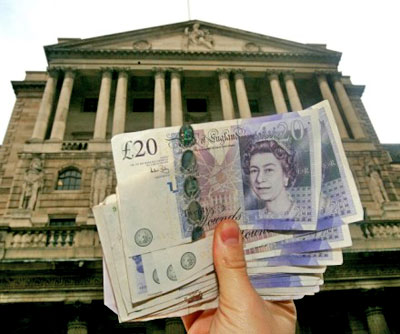|
from TheTelegraph Website
So now we know why the Bank of England's Monetary Policy Committee called a halt to more Quantitative Easing this week - it's because the Chancellor and the Governor of the Bank of England have concocted a backdoor way of doing the same thing.
The latest little (actually quite big at a tidy £35bn) money printing wheeze comes about as close to outright monetizing of government spending as it is possible for the Bank of England to go without simply creating the money and handing it by the lorry load to the Treasury, a la Weimar.
What the Treasury has decided to do is take the accumulated interest payments on the stock of government debt the Bank of England has bought under quantitative easing, and credit it to the Government's books rather than the Bank of England's.
The total is £35bn, of which the government intends to take £11bn this financial year and £24bn next.
This obviously helps the deficit in these two years quite a lot, creating space, should the Chancellor wish to take it, to ease back a little on the fiscal squeeze. For instance, he might choose to take the shadow Chancellor's advice and further delay a scheduled increase in fuel duties. It also makes it easier for Mr Osborne to meet his fiscal mandate of eliminating the structural deficit within five years.
Even the supplementary target of falling debt as a percentage of GDP by the end of the parliament - the one which City forecasters now widely believe Osborne will miss without further austerity - is marginally benefited by the latest piece of sleight of hand. It's as if Osborne has died and been reborn as Gordon Brown, who famously manipulated his own fiscal rules to destruction.
The Government excuses its actions by saying that it is only bringing itself into line with practice in Japan and the US, the other major economies to be practicing substantial QE right now. It might also be argued that to the extent the European Central Bank indulges in bond purchases, it practices something quite similar too.
In any case, you might reasonably think that it doesn't really matter how the government accounts for the interest on the Bank's stock of gilts.
Since the Bank of England is 100pc owned by the Treasury, the government has in essence only been paying interest to itself, so why not just stop the charade and save the money?
Wrong, wrong, wrong. The justification for keeping the interest is that it creates a buffer to fund expected losses on the gilts when the Bank of England comes to unwind its quantitative easing program. These losses are now going to have to be met by the government directly at some stage in the future.
Alternatively, the government could simply ignore them or write-them off. The Government is transferring the losses from today until tomorrow. The thin line which separates monetary from fiscal policy is being crossed in a way which substantially undermines the Bank of England's claim to independence.
Using the precedent set by the Bank of Japan by way of justification is instructive, because no-one any longer believes the Bank of Japan is independent of government. It is the mere puppet of deficit spending politicians.
Right from the start of QE, the Bank of England has struggled to maintain the pretense that this is not government financing but the legitimate exercise of monetary policy. Thus far, it's been just about possible to go along with this idea, even though the Bank of England's gilt purchases plainly do very substantially assist the government in financing itself at very low interest rates.
Never the less, a reasonable argument could be made for QE as a mere liquidity operation - the swapping of one asset, gilts, for another, cash - that could quickly be reversed when the economy picks up momentum again. But this is very different. A key part of the contract under which gilts are sold - the coupon - is now in effect being waived.
Though the government vehemently denies the notion, the Treasury is in essence defaulting on the gilts held by the Bank of England. Not good, not good at all.
This is a slippery slope, and I regret to say that the Bank of England is now very much on it.
UPDATE Is this monetary financing or not?
Both the Bank of England and the Treasury are naturally very keen to get across the idea that it is not. Far from it. What this is not about is the government defaulting on the coupon or anything of the sort, but merely sensible cash management.
The coupon will still be paid, but now it will be applied to reducing the deficit, and hence the national debt, rather than accumulated in a separate account at the Bank of England. The Government is adamant that the windfall will not be applied to government spending or tax cuts.
As things stood, it was a bit like the Government taking out an overdraft to pay money into a savings account - not very sensible given that you pay a lot for the overdraft but get virtually nothing back from the savings account.
The Treasury indemnity on the Bank of England's holding of gilts remains the same, so if there are losses at the end of the program, the government will have to pay them. Nowhere else in the world do governments accumulate cash against contingent liabilities, which is essentially what was happening under the old system.
So there you are - just sensible accounting.
Make of it what you will.
|

